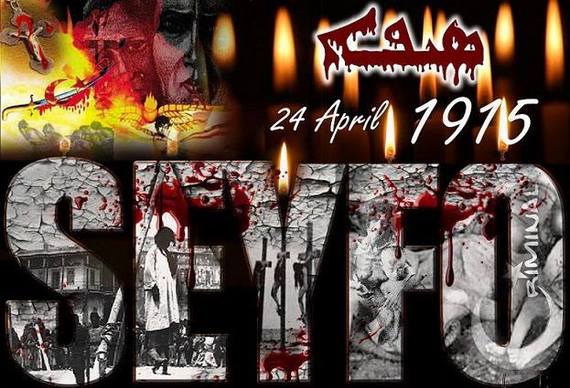April 24th, 2015 marks 100 years since some of the Ottoman leaders decided to wipe out Christian Armenians, Assyrians/Syriacs/Chaldeans, Pontic Greeks and other non-Muslims in the northeast part of their empire. Their aim was to ensure that no one would remember them and that no one would even know they ever existed. April 24th 1915, was the beginning of what would become a genocide. In order to weaken the Christians, they accused their leaders of treason.
My grandmother was four years old at the time. Her father, brothers and uncles were amongst those who were either arrested, and then killed or beheaded on the spot. Her father, who was an engineer, was at work far away from home. As the bloodbath was taking place, he was busy teaching how to melt metal cutlery, to make bullets. Thousands of lives were saved thanks to his efforts. At the same time, his own family, wife and sons were slaughtered, but his daughters survived. One of them, Meyyo, was my grandmother.
A Kurdish man found her among the bodies of her dead family that had been thrown into a well. Grandma grew up with his family. Nine years later, by chance, another Kurdish man, a family friend, caught sight of my grandma and, by some miracle, recognized her. He took her back to her hometown, Midyat.
I wish my grandma at least could have told me what Kurdish name she'd been given, but Seyfo, as we call the genocide, was taboo. My grandparents never wanted their trauma to be passed on to us. Not until I became a journalist and interviewed my grandfather's friends (my grandfather had passed away) did I understand the depth of what they'd experienced. Most of my grandparents' family had been rooted out. My great-grandmother threw her daughter into the river, hoping her child's life would be saved. She herself was beheaded because she belonged to the wrong religion.
Both of my grandmothers were known for always standing up for the weak. Never allowing them to be silenced. The strongest of them, the loudest one as well, was my fathers' mother. Her strength often ended her in trouble.
When my father later married my mother, they decided that their children would live in freedom and not in constant fear of Islamist oppression. My parents' decision meant that my siblings and I had the possibility to live in freedom. But my grandfathers' dream that we never have to face a genocide again, has been shattered.
"I will raise my voice, and I will make my song fly, so that the entire world will hear," the Assyrian poet and singer Ramina wrote these very words a few years ago. On February 23rd of this year, the terrorist organization, the so called Islamic State, invaded the village in North East Syria where she lived, she was kidnapped together with her three daughters. No one knows what happened to them. Not a word...
One hundred years have passed and the Turkish state still does not recognize that the genocide ever took place. And now the new Islamists have started a new genocide.

